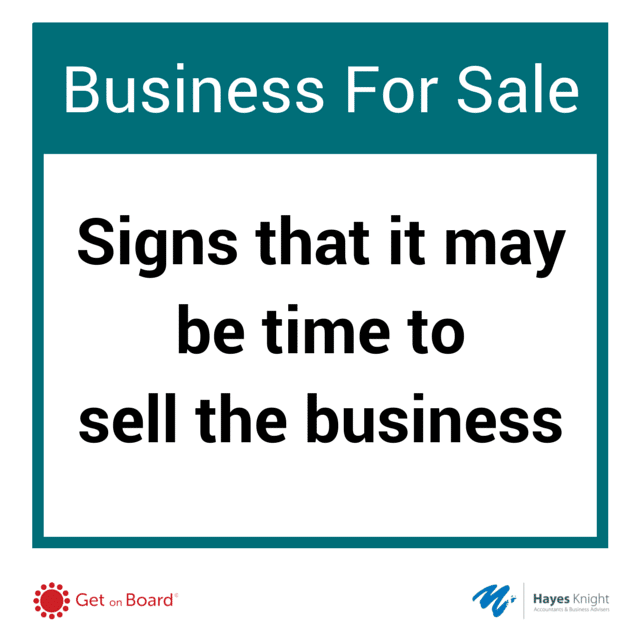Signs That it May be Time to Sell the Business

Knowing the right time to exit a business is often times a more important decision than deciding to go into business in the first place.
A business is often started with an idea, a limited amount of capital, and a load of enthusiasm. By the time the business has grown and developed it is likely worth far more than at commencement. When it comes time to sell, a lot of board get the exit decision wrong and end up paying a significant price for it.
A relatively small number of businesses continue through multiple generations. However, the majority either fail or are sold by the original owners. Timing the business exit is about understanding:
· The best time to realise value
· Whether your business has outgrown the owners
· Whether the business model is changing (for the worse)
· Whether the business owners have outgrown the business
Exit before the business’s value has peaked
A strong business with good prospects is always easier to sell, and a buyer is likely to pay a premium for their expectation of the future value to be created. Smart boards and owners monitor not only the value of their business but also the expectations for the future. Directors should have a good sense of where the business is on the value curve.
Some businesses outgrow their owners
Some people are great at running micro businesses, some are great at running small businesses, and some are great at mid size businesses. Success at one level is not an automatic guarantee of success at the next level. Each one has differences in the skill sets required.
The smaller the business, the more important it normally is for at least a handful of directors to be skilled at what the business does. The larger the business, the more important it is that the CEO and the board are good managers of finance, strategy, and business planning.
If you sense that the business is outgrowing the owner, then it may be time for them to consider exiting the business before the next stage of growth puts unnecessary pressure on the owner, the board, and the business.
Don’t believe that the business model will be forever constant
Business models change. The directors can drive this change, it may be driven by changes in the industry, or an alternative model emerges. For most boards and business owners the danger is that the business model is changing and they do not realise it.
If you are in an industry where the business model is changing, you need a good radar system to detect this, and then be able to assess whether it is for the better or worse.
If the model is changing, the message is to be at the front-end of the change, or to exit the industry before change over takes the business. Sitting in the middle may mean getting squashed.
The owner is outgrowing the business
Some business owners lose their enthusiasm once the business has grown to a certain stage. Where they relished the challenge of growing the business, they are bored with the sameness of a mature model.
A savvy board recognises this and works with the owner to plan their exit before a loss of enthusiasm translates into a dilution in business value.
Perhaps its time for a Health Check?
All of this says that directors need to keep reading what is going on with the business, and not just operationally. Doing a periodic health check on the business strategy and forward direction may raise signs on when it’s time to hang out the “for sale” sign.
For more information about Hayes Knight’s Succession and Business Planning services and how they may be able to help your board and organisation decide whether it’s time to sell, click here, or get in touch with Stacey Quinn or Richard Perkins

